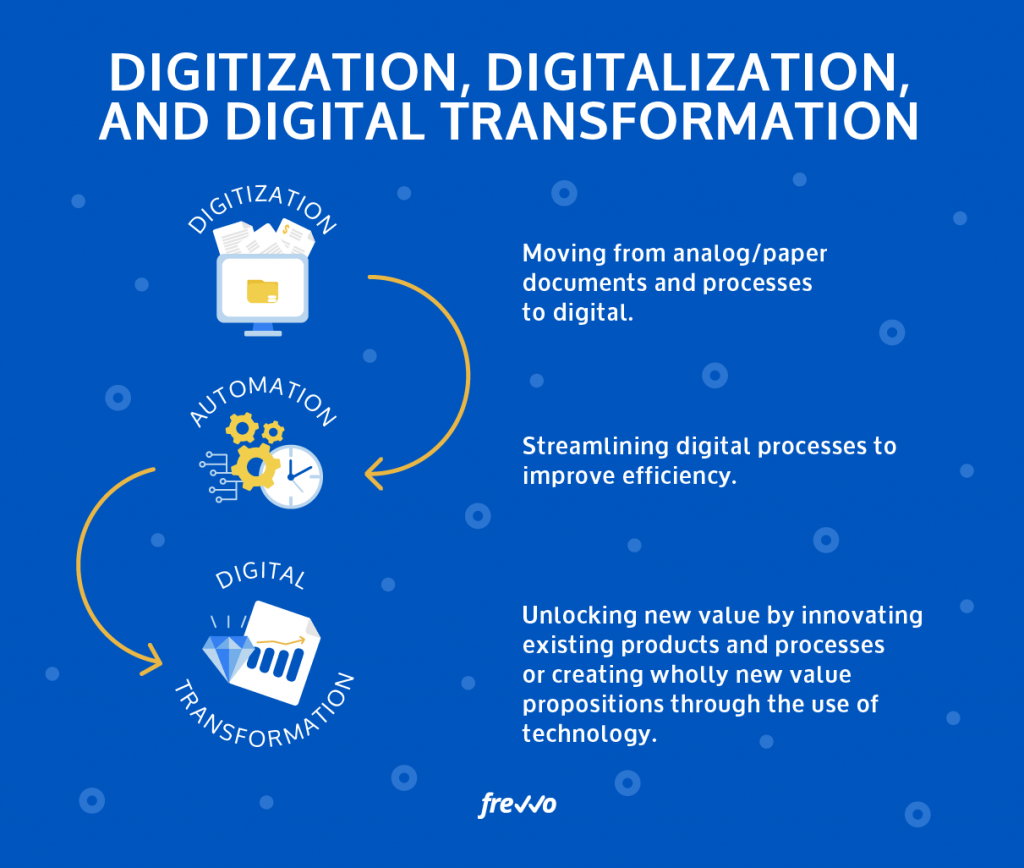Digital Transformation - barialim/architecture GitHub Wiki
What is Digital Transformation?
DT is not specifically about IT or Technology, rather its about Redefining your entire Business Strategy, perhaps even changing your corporate culture.
DT is not just applying technology to your business, its actually about creating entirely new business model.
DT is the process of using digital technologies to create new — or modify existing — business processes, culture, and customer experiences to meet changing business and market requirements.

What are the 4 types of Digital Transformations?
- Business Process
- Business Model
- Domain
- Cultural/Organisational
What is Digital Disruption example?
A few example of includes:
- Subscription business model introduced by Amazon, Hulu & Netflix which caused a disruption within the media and entertainment industries by changing how content is accessed by customers and monetized (__) by advertisers.
We often see corporations focused solely on process or organizational transformation.
What is an example of Digital Transformation?
Bringing AI/Data Science into your service organisation is a prime example of the power of DT.
For example, AI-powered Chatbots that answer simple customer inquires serve as a welcoming presence on your website, reducing the time customers have to wait to reach an agent/sales/support person.
Why is Digital Transformation is so important?
DT can have the most impact on a business when it comes to Automating workflows.
That's because some of the most disruptive technologies - such as Machines Learning, voice bots like Amazon Alexa, and AI are helping to automate ordinary tasks and improve how a business runs.
What are the 3 main components of Digital Transformation?
There are 3 essential components of a DT:
- The overhaul of processes
- The overhaul of operations
- The overhaul of relationships with customers.
What are the 4 pillars of Digital Transformation?
- Empower your Employees
- Foster collaboration,
- Fuel Productivity & maximize mobility to attract and retain top talent, which mitigating risks that come with providing freedom and space to employees.
- Engage your customers
- Optimize your operations
- Transform your products.
What is digital disruption example?
A few examples of digital disruption include:
- The subscription business model introduced by companies like Amazon, Hulu, and Netflix. which caused a disruption within the media and entertainment insdustries by changing how content is accessed by customers and monitized (refers to the process of turning a non-revenue-generating item into cash) by advertisers.
What is Digitalization?
Digitalization is the use of digital technologies to change business model and provide new revenue and value-producing opportunities; it is the process of moving to a digital business.
What's next after Digital Transformation?
AI continues to drive DT to the next level as time goes by. With all the data available, AI can effectively analyze patterns in large volumes of data. Machine Learning & AI are two technologies that work together.
Why do we need transformation?
In a world of unprecedented disruption and market turbulence, transformation today revolves around the need to generate new value—to unlock new opportunities, to drive new growth, to deliver new efficiencies. All transformations require you to rethink how your enterprise creates value today and in the future.
What are the advantages of digitalization?
8 advantages of digitalization of business: – Digital presence – New contact channels with customers – The customer at the heart of the Universe – Better decision-making – It improves efficiency and productivity – It encourages innovation – It makes communication and teamwork easier – It improves working conditions.
What are digital capabilities?
Digital capability is the term we use to describe the skills and attitudes that individuals and organisations need if they are to thrive in today's world. At an individual level we define digital capabilities as those which equip someone to live, learn and work in a digital society